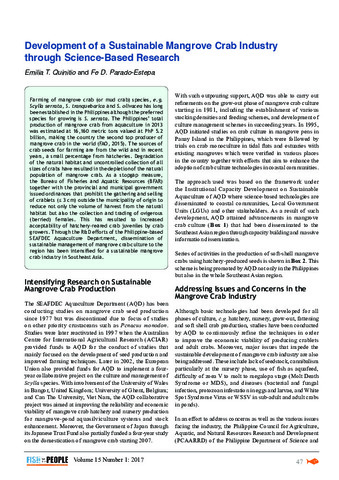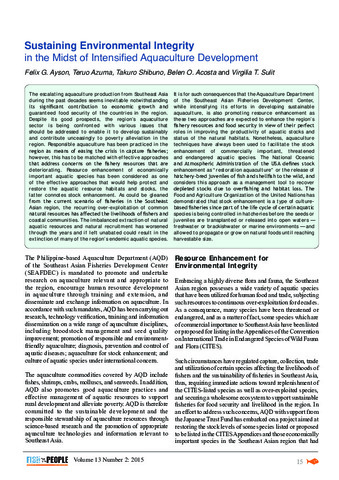Institutional capacity development for sustainable aquaculture and fisheries: Strategic partnership with local institutions
- Global styles
- MLA
- Vancouver
- Elsevier - Harvard
- APA
- Help

View/
Date
2008Page views
4,687ASFA keyword
AGROVOC keyword
Geographic names
Metadata
Perlihat publikasi penuh
Share
Abstract
Many people living in the rural areas in the Philippines, as in other developing countries in Southeast Asia, depend on aquatic resources for their food and livelihood. For the past two decades, the Aquaculture Department of the Southeast Asian Fisheries Development Center (SEAFDEC-AQD) has been working with fishing communities and people’s organizations, business sector, local government units, national government agencies, non-government organizations (NGOs) and academic and other research institutions to promote the efficient conservation, management and sustainable development of the country’s fisheries and aquatic resources so that these may continue to serve the needs of the people today and tomorrow.
Using the lessons learned from those two decades of multi-sectoral and inter-disciplinary collaborations, SEAFDEC-AQD launched in late 2006 a project called Institutional Capacity Development for Sustainable Aquaculture (ICDSA) to hasten the transfer to and adoption by coastal villagers of appropriate technologies that would enhance the productivity of aquatic resources and at the same time safeguard the fragile balance of the aquatic ecology.
The experience of SEAFDEC in coastal resource management shows that it is important to engage the collaboration of the local government units and other “on-the-ground” institutions, such as NGOs and people’s organizations, to be able to introduce effectively any social and technological interventions to target community-beneficiaries. However, before a fruitful collaboration among these institutions could be attained, there is a need to build their capacities, and those of the beneficiaries, for the vital roles that they play in the implementation of livelihood projects and environmental management programs.
As of January 2008, SEAFDEC-AQD is implementing ICDSA projects in four provinces—Antique, Capiz, Guimaras and Northern Samar in central Philippines. In the pipeline are similar projects for a province in southern Philippines and two provinces in the north.
Keywords
capacity building aquatic resources management sustainable aquaculture Malalison, PhilippinesSuggested Citation
Agbayani, R. F., & Toledo, J. D. (2008). Institutional capacity development for sustainable aquaculture and fisheries: Strategic partnership with local institutions. In K. Tsukamoto, T. Kawamura, T. Takeuchi, T. D. Beard, Jr., & M. J. Kaiser (Eds.), Fisheries for Global Welfare and Environment: Memorial Book of the 5th World Fisheries Congress 2008 (pp. 435-448). Tokyo: Terrapub.
Type
Conference paperKoleksi
- Conference Proceedings [299]
Related items
Showing items related by title, author, creator and subject.
-
Development of a sustainable mangrove crab industry through science-based research
Quinitio, Emilia T.; Parado-Estepa, Fe D. (Secretariat, Southeast Asian Fisheries Development Center, 2017)Farming of mangrove crab (or mud crab) species, e.g. Scylla serrata, S. tranquebarica and S. olivacea has long been established in the Philippines although the preferred species for growing is S. serrata. The Philippines’ ... -
Regional guidelines for responsible fisheries in Southeast Asia: Responsible aquaculture
This 43-page guidebook presents the code of conduct that has been re-written, expanded, clarified and annotated with definitions and examples to consider the fish farming industries in Southeast Asia. The source of the ... -
Sustaining environmental integrity in the midst of intensified aquaculture development
Ayson, Felix G.; Azuma, Teruo; Shibuno, Takuro; Acosta, Belen O.; Sulit, Virgilia T. (Secretariat, Southeast Asian Fisheries Development Center, 2015)The escalating aquaculture production from Southeast Asia during the past decades seems inevitable notwithstanding its significant contribution to economic growth and guaranteed food security of the countries in the region. ...






